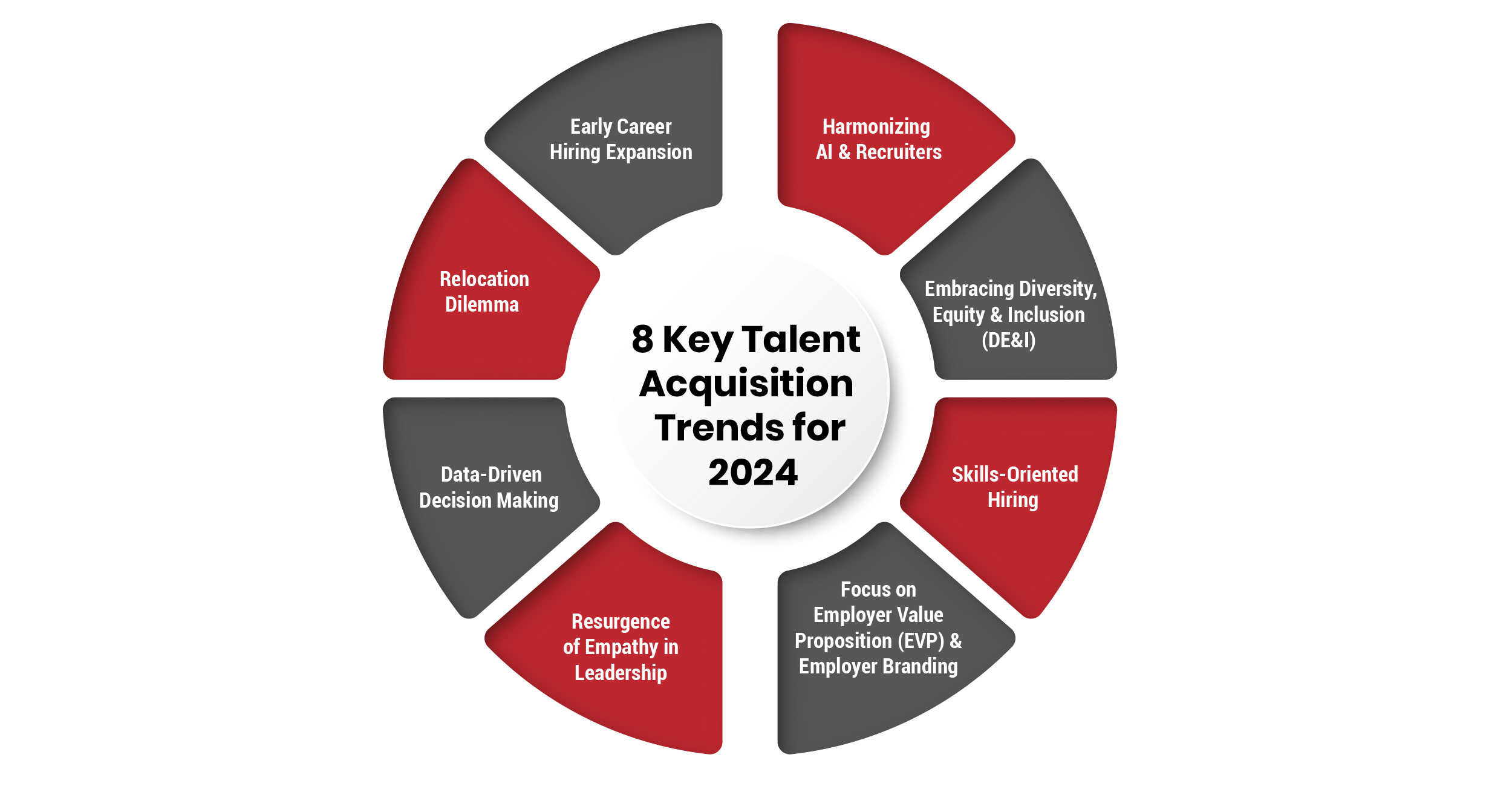New tech, new talent, new tactics - in 2024, talent acquisition is undergoing a swift transformation, prompting numerous questions and considerations.
While we cannot predict the future with certainty, combining the insights of global talent leaders with available data, we can surely paint a clearer picture of the latest talent acquisition trends.
Keep ahead of the curve and discover the talent acquisition trends of 2024.
Talent acquisition is an umbrella term that encompasses all the strategies, programs, and processes utilized to identify and recruit qualified job candidates within an organization.
Modern talent acquisition extends beyond traditional hiring methods to adapt to evolving labor market dynamics and drive organizational advancement. The talent acquisition team plays a pivotal role in this process and is responsible for identifying, acquiring, assessing, and hiring candidates for open positions within the company. They exhibit skills in sourcing strategies, candidate assessment, compliance with hiring standards, and proficiency in employment branding practices and corporate hiring initiatives.
Let’s look at the main talent acquisition trends that will define 2024

AI and recruiters are cautiously finding harmony in the hiring process. AI, particularly generative AI, is significantly impacting talent acquisition. While 82% of CEOs anticipate AI to have a notable impact on their businesses, there are lingering concerns regarding the accuracy of AI technology and the potential risk of losing the human touch. Despite the risks, AI continues to enhance efficiency by streamlining processes, writing job descriptions, and facilitating candidate assessments, thereby improving DE&I efforts. Employers must adopt AI-based tools for efficient and unbiased screening processes and interview scheduling to find and hire the best talent accurately and swiftly.
In 2024 DE&I initiatives will take center stage in key talent acquisition trends. Although Talent Acquistion leaders and companies spend less on DE&I initiatives, it shouldn’t be taken lightly. Candidates tend to pay serious attention to DE&I. Report says that 24% of candidates are seeking more diverse, equitable, and inclusive workplace cultures. To attract top candidates, it's crucial to go beyond superficial measures and create inclusive solutions that prioritize diversity and fairness.
2024 will be the year where skills will take precedence over an individual's past employer background. 48% of companies recognize that enhancing talent progression and promotion processes is a crucial business practice. This shift promotes diversity and organizational agility. Major American companies like IBM, Accenture, Bank of America, and Google are moving away from requiring traditional degrees for hiring— enabling individuals with the necessary skills, even without a four-year degree, to access a variety of job opportunities.
Recruiting will focus on EVP and employer branding as more candidates prioritize organizational culture and values over salary. Interestingly, 42% of Gen Z prioritizes mission and values over salary. This highlights the importance of crafting messages that offer a holistic and attractive proposition extending beyond conventional perks to meet these evolving preferences.
The importance of empathy in leadership resurfaces in 2024 as high-performing individuals seek environments conducive to work-life integration and open communication. CEOs are expected to prioritize listening and create inclusive cultures that accommodate personal circumstances, reflecting a shift towards empathetic leadership.
Data-backed insights will drive strategic decisions and streamline processes in talent acquisition. Embracing data will provide a competitive advantage in an evolving industry, with a significant increase in demand for data analysts anticipated by 2030.
Relocation challenges arise as employers recall remote workers to the office post-pandemic. Skyrocketing moving costs and shrinking relocation budgets complicate the decision for employees, leading to tough choices between relocating or resigning. It is vital that employers reconsider relocation policies to retain top talent and adapt to changing workplace dynamics.
In 2024, recruiters are broadening their scope for talent by targeting candidates earlier in their careers. This shift is driven partly by financial considerations, as entry-level hires command lower salaries during budget constraints. This approach caters to budget constraints and fosters diversity by tapping into non-traditional education pathways. Employers must also meet the evolving expectations of younger hires, focusing on inclusivity, work-life balance, and mental health support.
Each year, we get input on what’s trending in talent acquisition and what’s not. But what makes it important for us to keep up with these trends? Let’s understand—
The workplace is rapidly evolving, and it is becoming increasingly important to keep up with the evolutions and the reasons behind these evolutions. Here's a brief overview of the evolving work environment according to the World Economic Forum:
Talent acquisition trends pave the way toward a more inclusive, data-driven, and strategically aligned future. Whether it's embracing diversity, harnessing the power of AI, or making data-driven decisions, the possibilities for advancement are extensive. With a deep understanding of current talent acquisition trends, you can enhance your recruitment strategies for 2024.
This website uses cookies to enhance website functionalities and improve your online experience. By browsing this website, you agree to the use of cookies as outlined in our privacy policy .
Get unlimited free access to TopCHRO.com